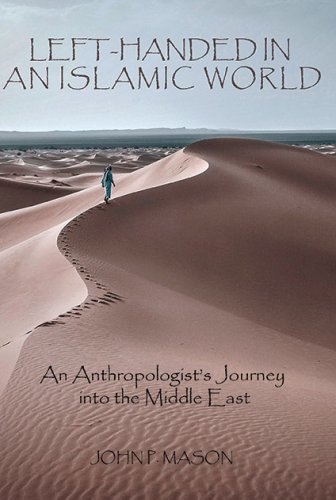
About the Author
John P. Mason, PhD, is an anthropologist who taught at Boston University, the University of Libya—Benghazi, Rensselaer Polytechnic Institute, and the American University in Cairo. He published academic and technical papers and reports over a long career in mixing academic and applied anthropology. Mason lived in Augila Oasis in the Libyan Sahara as part of his doctoral work. Several years later he served a second stint in Libya as an official of the United Nations. His four years in Cairo generated the many stories on Muslim and Christian Arabs in Egypt, as well as on the 1973 war with Israel. The majority of his career was as an international development consultant working mostly for USAID or the World Bank. After retirement he has been actively involved in the American Anthropological Association, Society for Applied Anthropology, and the Washington Association of Professional Anthropologists.
LEFT-HANDED IN AN ISLAMIC WORLD: An Anthropologist’s Journey into the Middle East
John P. MasonVellum, 2017
286 Pages, 28 Illustrations
ISBN 978-0-9981477-1-0 Paperback
For BULK ORDERS, order directly from New Academia Publishing.
Queries: orders@newacademia.com
About the Author
John P. Mason, PhD, is an anthropologist who taught at Boston University, the University of Libya—Benghazi, Rensselaer Polytechnic Institute, and the American University in Cairo. He published academic and technical papers and reports over a long career in mixing academic and applied anthropology. Mason lived in Augila Oasis in the Libyan Sahara as part of his doctoral work. Several years later he served a second stint in Libya as an official of the United Nations. His four years in Cairo generated the many stories on Muslim and Christian Arabs in Egypt, as well as on the 1973 war with Israel. The majority of his career was as an international development consultant working mostly for USAID or the World Bank. After retirement he has been actively involved in the American Anthropological Association, Society for Applied Anthropology, and the Washington Association of Professional Anthropologists.
About the book
A major aim of the book is to present stories of Arabs the author met and lived with as a social anthropologist. The stories cover a period from 1968-2012. Lawrence of Arabia serves as an inspiration for the journey. Throughout the book the author calls upon a significant amount of history to give a background and to contextualize the stories.
The stories describe the social lives of Arabs in a variety of places, those living in an oasis village, others in a mid-sized city, and yet others in a major metropolis. Some of the places are conflict or post-conflict zones. One is in a state of war. The countries include Libya and Egypt for longer periods and many other Arab countries for shorter visits. In most of the stories, the Arabs are Muslims, though in some they are Christians.
The book presents Islam in its many shapes and different contexts. At its ‘best,’ Islam will be seen as lived by Libyan Desert oasis villagers in creating a harmonious, well-lived life. In other cases, Islam will be glimpsed in ways not so favorable, especially in the treatment of non-Muslim Arabs living in Islamic societies. The author touches on a few theories as to why conflict is endemic to the Middle East. But none of these theories accounts fully for the recent emergence of the egregious behavior of such self-acclaimed groups as the Islamic State or ISIS, who pervert the religion to achieve their renewed Caliphate prophesies.
Being left-handed in a right-handed Islamic World was for the author a metaphor for some of the complexities of living in that World as a development anthropologist, and also when developing programs as an international development consultant for firms tied to USAID and the World Bank. Stories of success and folly of such programs in the Middle East are instructive for development practitioners.
The larger context raises questions about the Middle East and its perennial involvement in conflict, including the Arab-Israeli situation and the place of ISIS and al-Quaeda.
Praise
“The book is strong on the material based on fieldwork and familiarity with Arab culture and Islam. It gives fresh insights about the author and the training and method of American anthropology of the Arab world. Its hybrid narrative of personal and professional experience reflects well on Mason’s career. The book is useful to both the scholarly and diplomatic community for its original fieldwork.”
—Ali Abdullatif Ahmida, University of New England
“Dr. Mason’s book is just plain fun to read. It is interesting, amusing, and informative, without being annoyingly dense, complicated or tedious.
It is written in a voice that is human and recognizable, candid and friendly, rather than technical and scientific. It is refreshingly accessible to a broad audience, while being equally interesting for the academic, anthropologist or students of social science, international development, or Middle Eastern studies. The book has just the right mix of personal story, situational context, cultural and historical description to paint a realistic and holistic picture of life in seemingly exotic lands, made more familiar through this narrative. It does a good job of humanizing people who may well be very different from the reader.”
—Adam Koons, PhD., Applied Anthropologist, Overseas Humanitarian Assistance





 Coming Soon
Coming Soon Awards
Awards